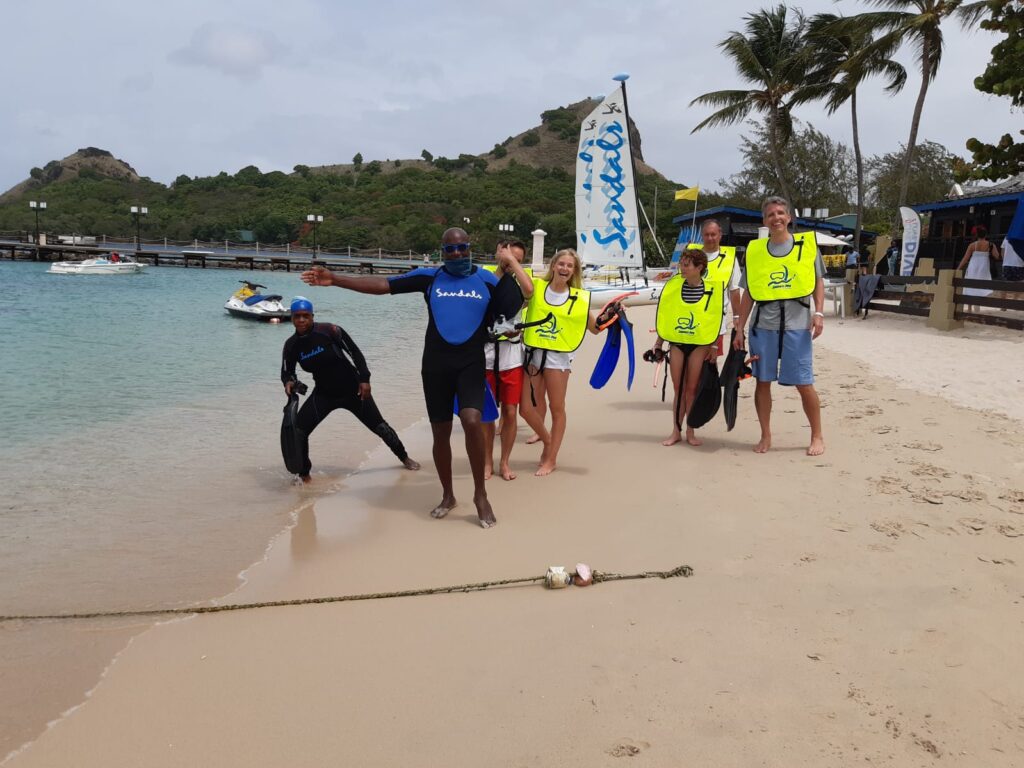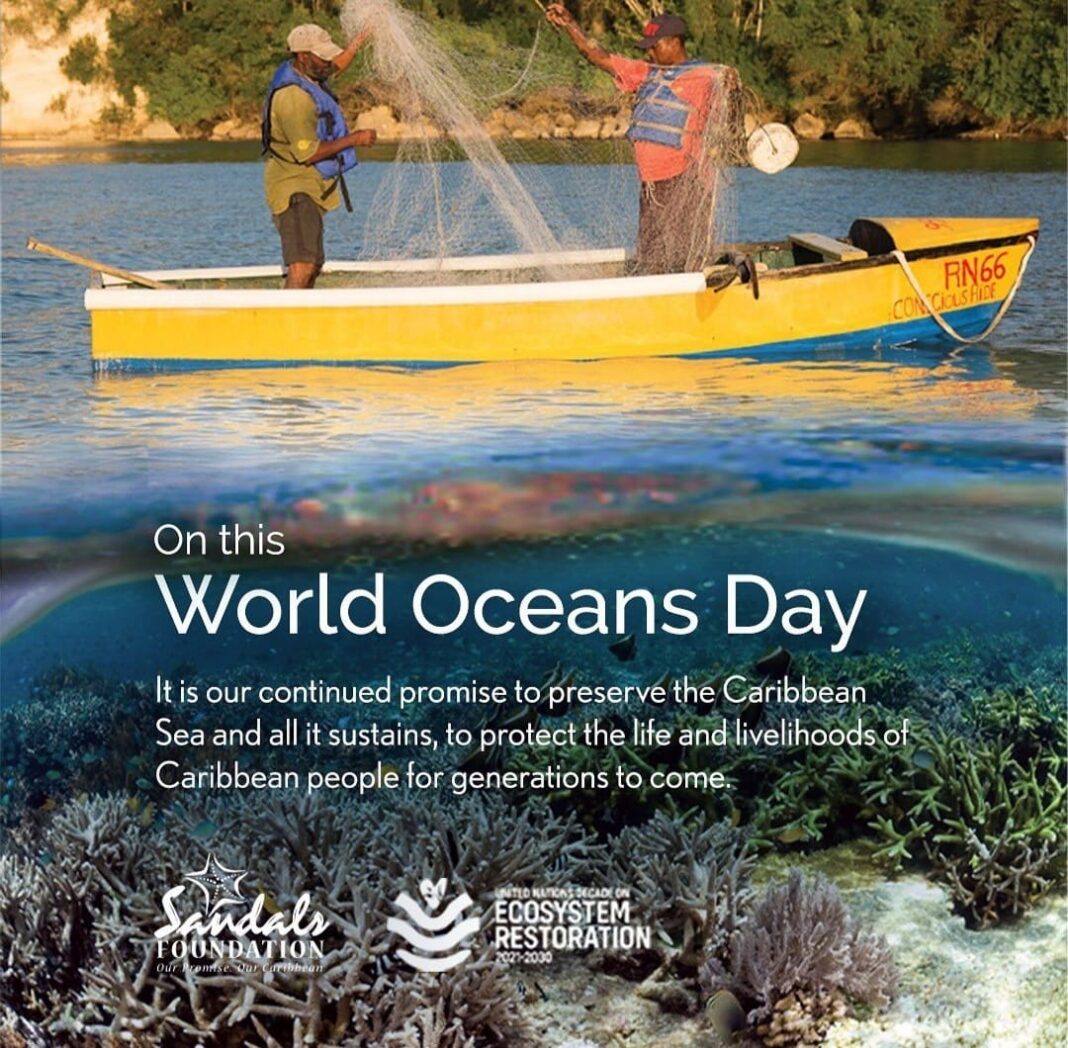By Earl Bousquet
Someone we dearly care about needs our help badly – and if we don’t act fast enough, it’s only a matter of time before we strangle her to death. For millennia, this Love of our Life has not only provided sustenance to Humankind, but also carried daring adventurers (like me) on the waves of her tresses, as we bravely plunged forth to link lands and people.
She’s always been a source of wonder and marvel and highly respected for her magnificence, as indelibly etched in world poetry by Saint Lucia’s very own Nobel Prizewinner, Derek Walcott:
Where are your monuments, your battles, martyrs?
Where is your tribal memory? Sirs,
in that grey vault. The sea. The sea
has locked them up. The sea is History.
I guess by now you know I’m talking about our Caribbean Sea — and the oceans that have forever washed our shores… But if Walcott had to revisit his masterpiece today, his questions to us might very well have been: Where, for instance, is your compassion? Where is your common sense and where is your decency?
Walcott would have asked these questions today because he would definitely have been astounded by the rape, pillage and constant violation that Our Species has increasingly imposed on that great aquatic mother — and more specifically, on that Caribbean Sea that unites us all in the embrace of her gently lapping waters and breathtaking azure hues.
Norway’s Prime Minister Erna Solberg and Palau President Tommy Remengesau Jr. noted (this week) that “Global warming, combined with the negative impacts of numerous other human activities, is devastating our ocean, with alarming declines in fish stocks, the death of our reefs, and sea level rise that could displace hundreds of millions of people.”

Likewise, rising sea levels should cause serious concern for all Caribbean people. For decades Mother Ocean has been force-fed a lethal diet of sewage and other discharges from factories and industrial plants. Even the pesticides and nutrients used in agriculture end-up in the coastal waters, resulting in oxygen depletion that kills marine plants and shellfish.
Maybe even more alarming is the depredation wrought upon our marine environment by the wanton disposal of what oceanographer Charles Moore described as ‘the waste that nature can’t digest’: Plastic!
Plastic pollution levels are simply alarming, to say the least, with everything living below the sea’s surface threatened everywhere by the amount of plastic already poisoning our oceans. In our Caribbean, fish, seabirds, sea turtles and marine animals are all either becoming entangled in or ingesting plastic debris, resulting in death by suffocation, starvation or drowning.
Indeed, a quick online search as we observed World Oceans Day on Tuesday (June 8) revealed that plastic waste kills over a million seabirds and over 100,000 other marine animals — every year; and the number keeps climbing at a staggering rate.
That day, I wished I could’ve urged all Caribbean people to reflect on the irreversible damage that can be done to our oceans and the resulting collapse of some of the world’s most important food sources. Two years ago, a systemic analysis conducted by the Wildlife Conservation Society showed that just 13% of the world’s oceans remain untouched by the damaging impact of humanity.
Celebrated environmentalist Sir David Attenborough, in his landmark BBC series ‘Blue Planet 2’, noted that our oceans are under threat now like never before in human history, with huge ‘dead zones’ being created as a result of unscrupulous industrial fishing. Only one thing sets us apart from every single one of the billions of planets in our known universe: WATER.
Earth is called The Blue Planet because of our oceans and it is this single fact that’s behind the sustenance of life as we know it. Our oceans help create the atmosphere above that allows us to breathe — so, by damaging our oceans we are committing planetary suicide. You might correctly assume that protecting our oceans is an ocean of a task by itself — and be right too, also asking yourself how can you make a difference…
But just as each journey begins with a single step and each megastructure begins with the first block, as grim as the battle appears, victory remains within our grasp. As legendary oceanographer Sylvia Earle optimistically noted: ‘It is the worst of times but it is the best of times, because we still have a chance.’
Yes, we still have a chance to save our oceans — but it’s like the ocean’s waters through our fingers and unless we cup our hands with determination, it will slip away. It was heartening again, therefore, to see that we also have our champions — in the Caribbean — putting their hands up to make a difference.
I saw on Tuesday a public service announcement and a published poster about the region’s top resort company (Sandals) quiet efforts to drive home the message of environmental awareness.
Executive Chairman Adam Stewart has a long record as an advocate for protection and preservation of the Caribbean’s environment and this has been a key pillar of the work undertaken by The Sandals Foundation. You might say that as a resort, they are compelled to be an exponent of oceanic awareness because their properties sit on Caribbean beaches – and I would agree.
But Mahatma Ghandi wisely advised: ‘Be the change you want to see in the world!’
In that regard, here’s a few simple ways you can be that change: Eat sustainable food, reduce energy consumption, manage the use of plastic products (or avoid plastics as much as you can), properly dispose of hazardous waste, manage the use of fertilizers/aerosols etc., practice good disposal habits (and even do some beach clean-up efforts with your family), buy ocean-friendly products and — most importantly — share this message out-at-large as possible…
All you need to do is all what you can — and collectively WE CAN CHANGE THE WORLD!




